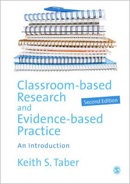Educational Research Methods

A site to support teaching and learning...
The following text is part of a vignette taken from a master’s research thesis (Taber, 1989).
This is a personal site of Keith S. Taber to support teaching of educational research methods.
(Dr Keith Taber is Professor of Science Education at the University of Cambridge.)
2017
Gill: A vignette
(The "typical" female pupil's experience of physics at the enquiry school, in comparison to a "typical" male peer.)
General experiences in science lessons
Over her school career Gill will find her science teachers paying her and Barry a similar level of interest, asking and answering questions, giving instructions and so forth - both in open class exchanges and in private discussion. However she may notice that her interaction with science teachers tends to be different from the way science teachers interact with Barry in two senses. For one thing the initiation of interaction may be different: when the teacher talks to Gill in front of the class it is more likely to be because the teacher specifically addresses Gill, or Gill herself initiates the discussion, whereas Barry is more likely to be shouting out an answer to the teacher's question than Gill, perhaps seeming to be trying to draw attention to himself.
The second way in which Gill's interaction with her science teacher is different from Barry's concerns what the exchanges are about: for one thing Barry will be told-off and given instructions about how to behave more often than Gill In some lessons this difference will be so obvious that the boys may seem to dominate the class and Gill may sometimes feel that the boys' bad behaviour means they get more attention from the teacher than do the girls. Gill may also find that more of the teacher's exchanges with her concern lesson administration (giving out books for example) whilst more of Barry's interaction with the teacher concerns the science content of the lesson. Gill is likely to find she is taught science by teachers with a range of ideas about the desirability of distinct gender roles in society, and the role the school should have in effecting social change.
Gill is unlikely to be subjected to any form of serious physical assault in the science classroom, although she will learn to expect - and probably accept - that occasionally some of the boys will insult her, physically manipulate and intimidate her, and subject her to the odd poke or slap. Gill will reciprocate much less often. Gill may interpret these incidents as boys showing they are "in charge' in the laboratory rather that any overtly aggressive intent. She is likely to find that her teachers consider such "horse-play" to be a natural part of the interaction found in classrooms. On odd occasions Gill may witness an unpleasant scene between two of the boys in her class, but she is less likely to see, or be involved in, such incidents with girls in her lessons.
Attitudes and perceptions on entering the school.
First year experiences of science.
Comment on the ethics of this type of research writing

